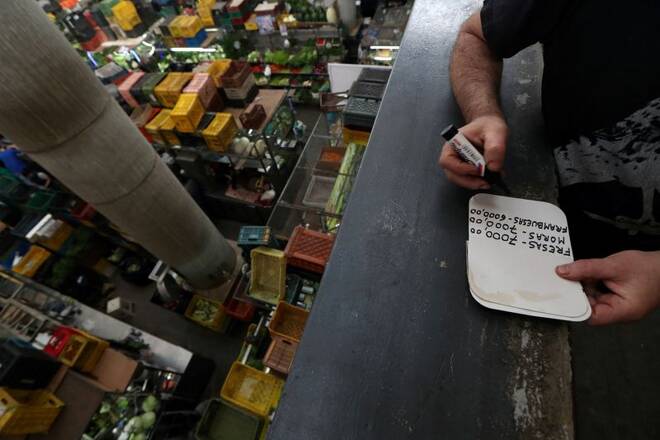Advertisement
Advertisement
Venezuela inflation accelerating, heightening risk of return to hyperinflation -economists
By:
CARACAS (Reuters) - Venezuelan consumer prices rose at a sharp 37.2% clip in December from November, heightening the risk of a return to hyperinflation, according to estimates by the Venezuelan Finance Observatory, a non-governmental group of economists.
CARACAS (Reuters) – Venezuelan consumer prices rose at a sharp 37.2% clip in December from November, heightening the risk of a return to hyperinflation, according to estimates by the Venezuelan Finance Observatory, a non-governmental group of economists.
The private inflation estimate is key since Venezuela’s central bank, which in October said annual inflation hit 155%, one of the highest rates globally, has not released consumer price data since then.
For nine consecutive months, consumer price inflation was in the single digits thanks to strict policies implemented by President Nicolas Maduro’s government, anchoring the exchange rate, limiting public spending and increasing taxes.
After the policies were rolled out, authorities said Venezuela had emerged from a four-year streak of hyperinflation.
But the strategy has begun to crack, sources have told Reuters. Since November, the government has ramped up spending and demand for dollars has outstripped the central bank’s foreign currency reserves, meanwhile the local bolivar currency has weakened further and impacted prices.
Venezuela’s year-on-year inflation in December was likely 305.7%, the group estimated.
“Venezuela’s economy is facing the danger of a hyperinflationary outbreak, which is gaining strength with the sustained devaluation of the bolivar carried out by the central bank,” the group said in a statement.
The central bank did not respond to a Reuters request for comment.
In December, clothing and footwear prices rose 57.8% from the previous month, while household wares rose 55.8%, according to the estimates.
Cash flow into the country has dropped amid an exchange rate storm, with the government pausing cash payments in dollars to some suppliers, affecting the public sector.
(Reporting by Mayela Armas; Writing by Kylie Madry; Editing by Anthony Esposito and Diane Craft)
About the Author
Reuterscontributor
Reuters, the news and media division of Thomson Reuters, is the world’s largest international multimedia news provider reaching more than one billion people every day. Reuters provides trusted business, financial, national, and international news to professionals via Thomson Reuters desktops, the world's media organizations, and directly to consumers at Reuters.com and via Reuters TV. Learn more about Thomson Reuters products:
Did you find this article useful?
Latest news and analysis
Advertisement
